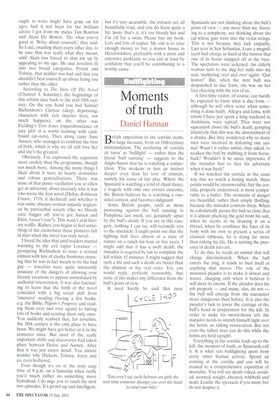Moments of truth
Daniel Harman
British opposition to the corrida stems, in large measure, from an 18th-century mistranslation. The rendering of 'corrida de taros' as 'bullfight' — rather than the literal 'bull running' — suggests to the Anglo-Saxon that he is watching a competition. This awakens in him an instinct deeper even than his love of animals, namely his sense of fair play. Where the Spaniard is watching a kind of ritual dance, a tragedy with only one correct outcome, the Briton believes he is watching a onesided contest, and becomes indignant.
Some British people, such as those protesting against the bull running in Pamplona last week, are genuinely upset by the bull's death. If you are in this category, nothing I can say will reconcile you to the spectacle. I might point out that the fighting bull lives almost in a state of nature on a ranch for four or five years. I might add that it has a swift death: the matador is required by law to complete the kill within 15 minutes. I might suggest that such a life and such a death are better than the abattoir or the veal crate. Yet, you would reply, perfectly reasonably, that none of this makes any difference from the bull's point of view.
It need hardly be said that most Spaniards are not thinking about the bull's point of view — any more than we, listening to a symphony, are thinking about the cat whose guts went into the violin strings. This is not because they lack empathy. Last year in San Sebastian, I saw a magnificent bull charge so hard at the barrera that one of its horns snapped off at the base. The spectators were sickened. An elderly woman next to me dug her nails into my arm, muttering over and over again: 'Que horror!' But, when the next bull was despatched in due form, she was on her feet cheering with the rest of us.
A first-time visitor, of course, can hardly be expected to know what is due form — although he will often sense when something is done badly. Allegra and Jema, with whom I have just spent a long weekend in Andalusia, were typical. They were not squeamish about the bull's death, grasping intuitively that this was the denouement of a drama. But they wondered why so many men were involved in defeating one animal. Wasn't it rather unfair, they asked, to weaken the bull by stabbing it from horseback? Wouldn't it be more impressive if the matador had to face his adversary when it was fresh?
If we watched the corrida in the same way that we watch a boxing match, these points would be unanswerable; but the corrida, properly understood, is more comparable to a ballet. The moments of danger are beautiful, rather than simply thrilling, because the matador controls them. When he calculatedly passes the bull so close that it is almost plucking the gold from his suit, when he seems to be drawing it on a thread, when he combines the lines of its body with his own to present a series of classical tableaux, he is doing far more than risking his life. He is turning the presence of death into art.
To do this, he needs an animal that will charge discriminately. When the bull enters the ring, it tends to hurl itself at anything that moves. The role of the mounted picador is to make it slower and warier, charging only when it believes it will meet its enemy. If the picador does his job properly — and many, alas, do not — the bull will emerge from the encounter more dangerous than before. It is also the picador's task to lower the carriage of the bull's head in preparation for the kill. In order to make his sword-thrust tell, the matador needs to stretch himself right over the horns, so risking evisceration. But not even the tallest man can do this while the horns are held upright.
Everything in the corrida leads up to the kill: the moment of truth, as Spaniards call it. It is what sets bullfighting apart from every other human activity. Spend an evening at the corrida and you will be treated to a comprehensive exposition of mortality. You will see death risked, avoided, scorned, sought, cheated, withheld and dealt. Loathe the spectacle if you must; but do not despise it.


























































 Previous page
Previous page